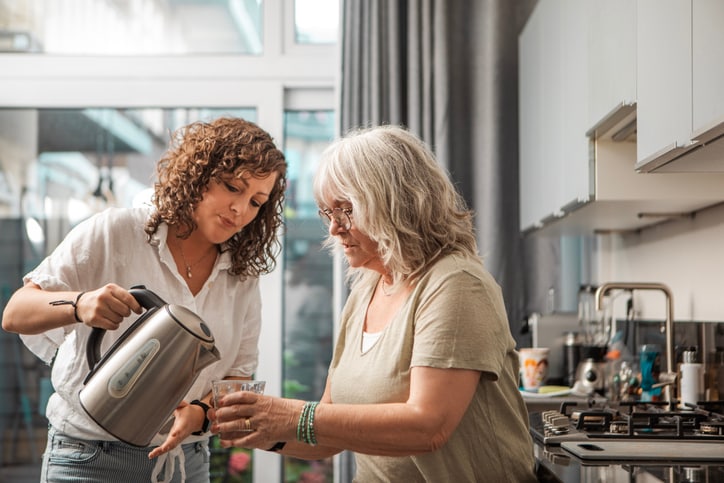In this article
When it comes to senior care, older adults have a number choices — particularly those not in need of a complete lifestyle overhaul. One care option is a personal care assistant (PCA), or as they’re also known as, a personal care aide.
Unlike certified caregivers, such as home health aides, who can monitor health conditions or registered nurses, who can administer medication, PCAs assist with non-medical personal tasks.
“Personal care assistants help older adults or folks with disabilities with daily tasks in order to make their lives easier,” explains Moti Gamburd, CEO of CARE Homecare in Los Angeles, a company that offers services like meal prep, transportation and companionship. “They’re not trained to do medical work but help with things like getting dressed, taking a shower or preparing meals.”
To learn more about PCAs, how they differ from certified caregivers and more, read on for expert insight.
Key takeaways
- Personal care assistants (PCAs) can help out with personal and household tasks.
- PCAs are not permitted to assist with anything medical.
- Certified caregivers, such as home health aides, offer more support.
What is a PCA (Personal care assistant)
A personal care assistant helps people who may have difficulty with daily activities that might be due to health issues, disabilities or aging, explains Christopher Norman, a board-certified geriatric nurse practitioner with the National Council on Aging.
“Their job is to support the independence and improve the life quality of their clients by offering help with personal care, meal preparation and transportation to appointments,” he says. “They also can provide companionship and may assist with physical therapy and household chores to ensure a safe and clean living environment.”
PCAs, adds Gamburd, assist people who need a little extra help in order to live comfortably at home. “That said,” he notes, “they do not do any medical procedures or provide medical treatment.”
Personal care assistant vs. certified caregiver
PCAs differ from certified caregivers in that they are not permitted to assist with anything medical. Meanwhile, certified caregivers, depending on their role, certification and where they’re working, may. For instance, home health aides can check vital signs, such as pulse, temperature and respiration, as well as monitor their patient’s physical and cognitive state.
Certified nursing assistants (CNAs) — also a type of certified caregiver — can take on more complex work, such as wound care and emptying catheter bags. (To be clear, “certified caregiver” is a blanket term for a number of different senior caregivers.)
On the other hand, PCAs, while different from companion caregivers, focus solely on non-medical tasks, and they can be whatever the client needs (more on this below).
What are the duties of a PCA?
The exact role a PCA takes on depends on the client, but here are some of the tasks within their scope, according to Gamburd and Norman:
- Help with personal hygiene tasks, such as bathing, brushing teeth, dressing and grooming.
- Light housekeeping.
- Errand running.
- Meal prep or cooking meals according to dietary needs.
- Companionship and emotional support.
- Transportation.
It’s also worth noting that, in some situations, home health aides can perform the tasks of PCAs for more pay.
What certifications do PCAs have?
In some cases, Norman notes, a high school diploma is enough. “Training is usually on the job, where PCAs learn about their clients’ specific needs and basic healthcare practices.” However, CPR and basic first aid certifications are often needed, Gamburd notes, adding that folks will often “take courses or training programs to improve their skills.”
All that being said, different states have different requirements. For instance, in New York, PCAs need 40 hours of training approved by the Department of Health. To check the specific PCA requirements in your state, senior care policy organization PHI has an interactive map.
Important note: Certified caregivers, such as home health aides, have significantly more training than PCAs, as they have more complex responsibilities. Federal law says home health aides must complete 75 hours of training, along with 16 hours of hands-on training, but some states require more.
Consult with PHI’s map to see what’s required in your area.
Are PCAs covered by insurance?
Depending on the situation and type of insurance, PCAs may be covered by insurance. Private insurance coverage varies, and per the Centers for Medicare and Medicaid Services, Medicaid PCA services are “provided to eligible beneficiaries according to a state’s approved plan, waiver or demonstration in the beneficiary’s home or at other locations.”
Read more:
The bottom line
PCAs are a great option for older adults who are in generally good health and who are aging-in-place. “The job of a PCA is pretty straightforward,” notes Gamburd. “Their main objective is to make sure the person they care for feels comfortable and supported in their daily routine.”




